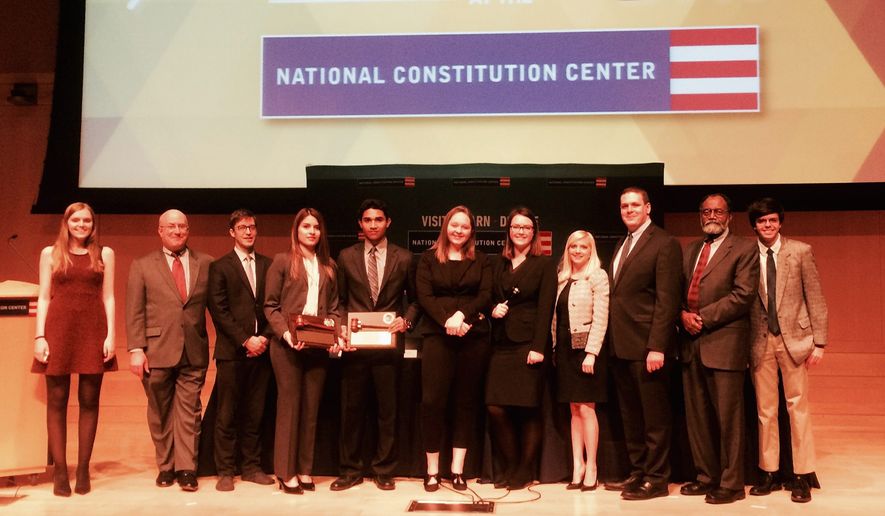Every year, thousands of students across the nation take part in civics and history competitions. They work tirelessly to study the United States Constitution, American history and government so they can answer questions in front of panels of esteemed judges or write essays evaluated by experts.
The students who participate in these competitions represent what is best about America. They are engaged, informed, and involved. Many go on to become leaders in their respective fields.
National Constitutional Literacy Campaign partners host several of these annual competitions, including the ConSource-Harlan Institute Virtual Supreme Court Competition, the Center for Civic Education’s We the People: The Citizen and the Constitution Competition, the Constitution Bee, the Marshall-Brennan Constitutional Literacy Project’s Annual Moot Court Competition, the Nethercutt Foundation Citizenship Tournament, and One Generation Away’s Roots of Liberty national essay contest.
We interviewed the student winners of these competitions to learn more about their views of civic engagement, the Constitution and the balance of powers. Not surprisingly, the views of these young citizens correlate with the views of their adult counterparts. They share similar anxieties and concerns about the future of the country.
Avery Merill, a 13-year old winner of the Constitution Bee, feels that “[w]e as a country are walking down a very dangerous path.”
Similarly, Ryan Premi, a high school student on the Lincoln High School (Portland, OR) winning class of the Center for Civic Education’s national We the People competition, feels that “[a]lthough the U.S. views itself as this shining beacon of freedom, there [are] so many issues that we have at such a fundamental level [and] there are so many abuses of powers, rights and laws that [have caused] so many problems in the USA.”
Despite expressing deep concerns about where the country is headed, most of the students expressed positive views about the future. They draw this optimism, in part, from their experiences with student competitions, which showed these young citizens how to effect positive change at the local, state and national level.
Tanya Reyna, a winner of the ConSource-Harlan Institute Virtual Supreme Court Competition, noted that while her local community in Texas suffers from “an influx of drugs and criminals” and has dampened her views about the future of her community and the nation, her experience with the Virtual Supreme Court Competition “eased [her] apprehension” about the future. She said that meeting students, lawyers, professors and judges willing to take time out of their busy schedules “to inform younger generations of citizens about our legal system,” demonstrated to her that “as long as there are citizens like them, America will continue to hold a bright future.”
Similarly, David Ndiyo, a winner of the Marshall-Brennan Constitutional Literacy Project’s Moot Court competition, shared that the experience changed his view of the future of this country substantially. Before taking part in the project, he said, “I have to admit I was slightly worried about how little young people cared or knew about how this nation works, about the Constitution, and about how they affect their day to day lives, but the simple fact that a program such as this exists has given me reason to ease those fears. [Meeting other] people my age … that are aware and feel so strongly about the Constitution and their citizenship fills me with hope for the future of our country and now I feel we will be in good hands in the future because we will be led by a group of thoughtful individuals who work well in a collaborative environment and care about their communities.”
Furthermore, these young people have a much richer and deeper appreciation for the value of civic learning and engagement.
Joshua Ross, a winner of the Nethercutt Foundation Citizenship Tournament, believes that “civic engagement is a lot more than marking bubbles on a ballot slip. It requires active involvement in local, state, and national politics. It requires standing up for what [you] believe in. It requires being ’anxiously engaged in a good cause.’”
Chase Merrill, another Constitution Bee winner, plans to share what he’s learned with people he knows and pledges that when he is old enough to vote he will “help elect honest, wise, and moral men and women to be our representatives.” He believes that a “good citizen studies American history and current events, is respectful of the rights of other citizens, and upholds and defends the principles of the Constitution.”
Our hope is that as we enter the final leg of the 2016 election, citizens of all ages reflect on the views of these incredible young citizens.
For them, in the words of 13-year old Avery Merill, the Constitution “provides for the three branches of government to check and balance each other, but it is the people’s responsibility to check them all.”
We can ensure that citizens are prepared to fully and ably serve in that role by supporting lifelong civics instruction and the many civics competitions offered to young people all over the country. You can learn more about these competitions and the organizations that run them at www.ConstitutionDays.org.
• Julie Silverbrook is the executive director of The Constitutional Sources Project (ConSource.org), a nonprofit organization devoted to increasing understanding, facilitating research, and encouraging discussion of the U.S. Constitution by connecting individuals with the documentary history of its creation, ratification, and amendment. Julie holds a J.D. from William & Mary Law School. In 2015, she and venture capitalist Chuck Stetson founded the National Constitutional Literacy Campaign.




Please read our comment policy before commenting.